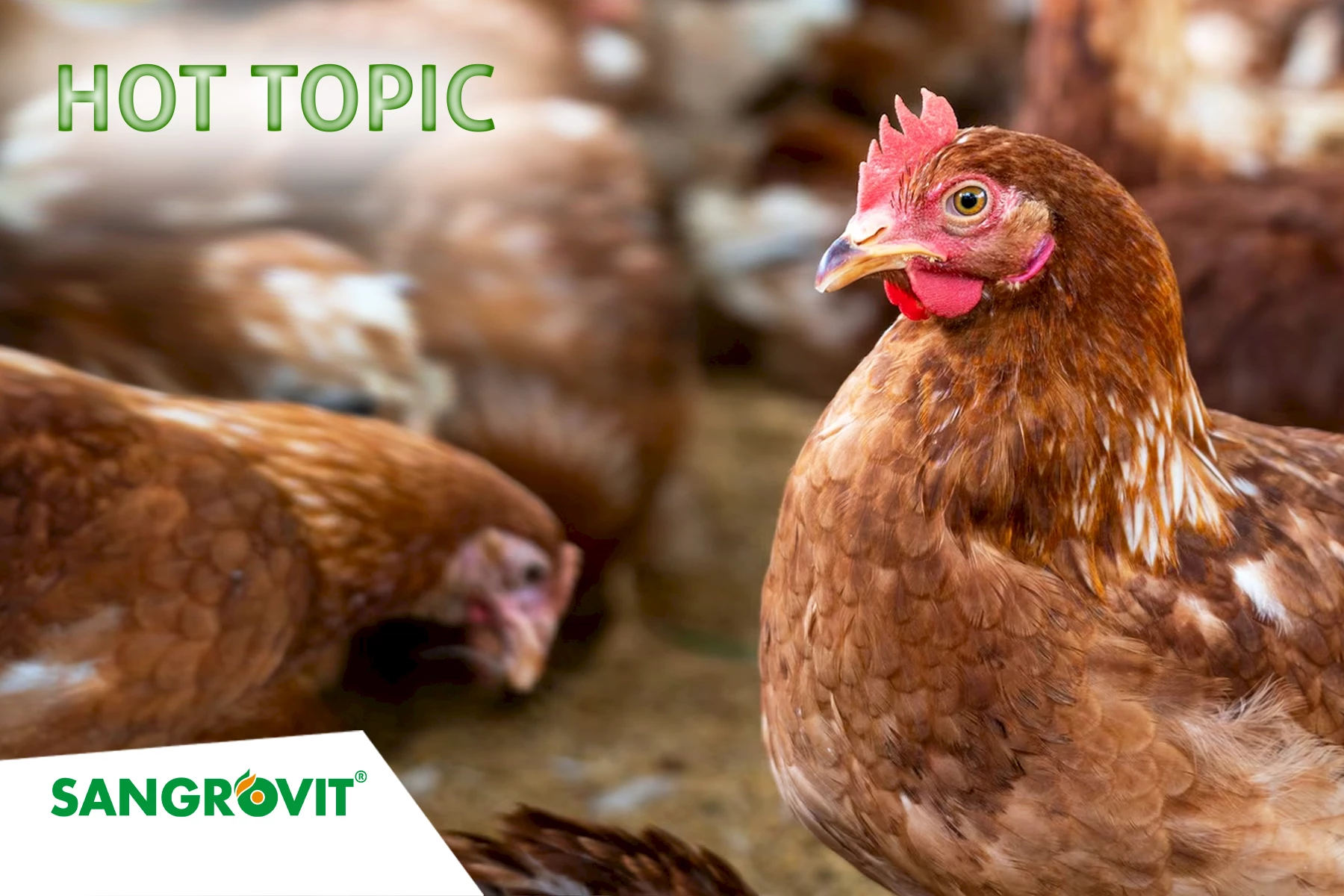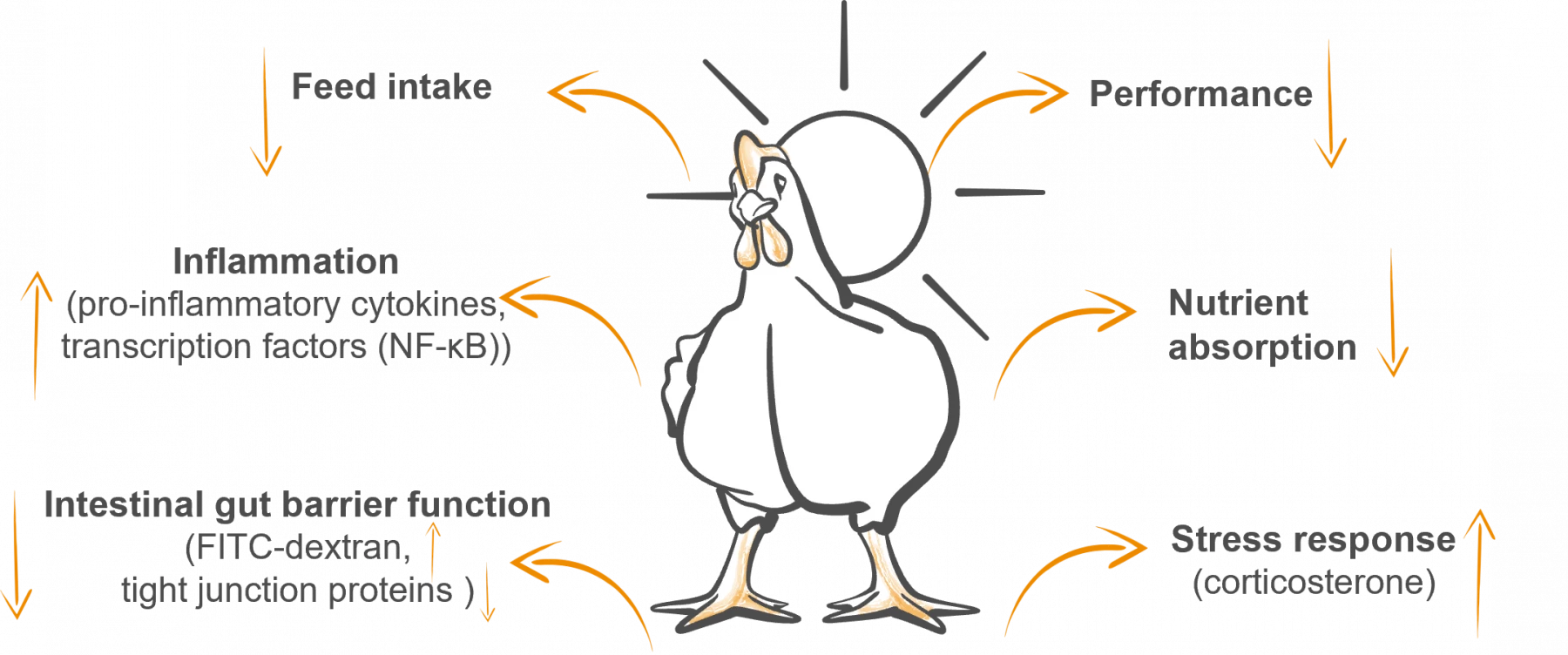
Poultry is susceptible to heat stress
Modern poultry breeds are more prone to heat stress than indigenous breeds due to their higher feed intake, rapid metabolic rates, increased basal metabolic heat production, fast growth, and an overall high level of productivity. In addition, poultry lack sweat glands and the skin is efficiently insulated by feathers, impeding heat loss.
How do birds react to heat stress?
Birds will try to adapt to heat stress by increasing their respiratory rate, i.e., panting, wing elevation, increased body temperature, and reduced activity.
To remove heat from the body, blood flow is directed away from the gastrointestinal tract (GIT) towards skin, comb and wattles. Another effective mechanism to reduce heat production is to lower the feed intake by as much as 20 % (Quinteiro-Filho et al., 2010). Consequently, performance deteriorates. In addition, nutrient absorption decreases, exacerbating the effects of a decreased feed intake. Heat stress and intestinal inflammation go hand in hand with far reaching consequences on intestinal barrier function. Heat stress clearly impairs gut integrity, thus contributing to decreased performance and enhanced risk of bacterial translocation from the intestinal lumen into the blood stream.
The impact of heat stress on broiler chickens can be evaluated by measuring different factors, such as pro-inflammatory cytokines (inflammatory response), corticosterone (stress response), FITCdextran or tight junction proteins (markers for gut integrity), and of course performance, including feed intake (Fig. 1).

Fig. 1: Consequences of heat stress in poultry
Less inflammation = better gut integrity = better feed intake = better performance
In a trial at the Prince of Songkla University in Thailand, the effect of plant-derived isoquinolie alkaloids (IQs) on broiler chickens reared under natural heat stress conditions was evaluated. Certain IQs are known for their positive effect on inflammation management (Khadem et al., 2014) and gut barrier function (Kikusato et al., 2021).
720 male Ross 308 broiler chickens were randomly allocated to three treatments (n = 8): I) negative control (NC), II) IQs60 (60 ppm Sangrovit® Extra), or III) IQs100 (100 ppm Sangrovit® Extra). Birds were kept in floor pens in an open house during the summertime in a tropical climate area. During the trial period of 42 days, temperature ranged between 33.0 and 35.0°C, while humidity varied between 70 and 75 %. On day 35, 8 birds per treatment were sacrificed to assess the inflammatory and stress status of birds as well as gut integrity.

Fig. 2: Inflammatory factors and assessment of gut integrity with FITC-dextran in broiler chickens kept under heat stress conditions.
NF-κB is a transcription factor which activates the transcription of genes for pro-inflammatory immune modulating cytokines like TNF-α. Under heat stress conditions, the expression of both NF-κB and TNF-α was significantly reduced in IQs-fed birds, indicating anti-inflammatory effects of IQs. As a consequence, gut integrity was improved as indicated by lower FITC-dextran levels as FITC-dextran can only pass from the lumen into the bloodstream if gut integrity is impaired (Fig. 1).
Corticosterone is an indicator for the stress response. Birds supplemented with IQs showed significantly reduced corticosterone levels under heat stress conditions. As a result of inflammation management, gut integrity improvement and stress management, feed intake increased in IQs-fed birds, resulting in a better performance (Fig. 2).

Fig. 3: Impact of IQs on birds reared under heat stress conditions on corticosterone, feed intake, and body weight.

Heat stress has a severe impact on broiler chickens – intestinal inflammation, an impaired gut barrier function, an elevated stress response, and a lower performance are the consequences.

Use Sangrovit® to support broiler chickens under heat stress conditions
The effects of Sangrovit® on heat stress in broiler chickens was investigated at the Prince of Songkla University in Thailand.
Results showed a positive impact of Sangrovit® on inflammation management, stress levels, and gut barrier function during heat stress. This resulted in a higher feed intake and consequently an improved performance.

Based on scientific and practical experiences, the recommended inclusion rate of Sangrovit® in broilers under heat stress conditions is:
| Species | Sangrovit® Extra |
| Broiler chickens | 100 g/t feed |

Dr. Anja Pastor did her PhD in broiler nutrition. At Phytobiotics, she is part of the Sangrovit® product mangement, focusing on applications in poultry by defining market needs and supporting these needs with scientific research. Anja enjoys sharing her enthusiasm about poultry with others, for example, when giving technical trainings or attending scientific conferences.
Contact our experts or send us a message. We will contact you as soon as possible.